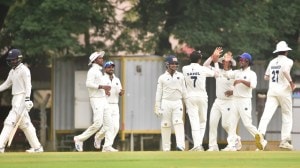Stay updated with the latest - Click here to follow us on Instagram
Ex-officers divided over choice of new Army chief
Retired officers say counter-insurgency profile of Army chief designate may leave other fighting arms in the lurch.
 On experience in counter-insurgency and counter-terrorism operations the COAS-designate Lt Gen Bipin Rawat has. (file)
On experience in counter-insurgency and counter-terrorism operations the COAS-designate Lt Gen Bipin Rawat has. (file)
THE SUPERSESSION of Lt Gen Pravin Bakshi and Lt Gen PM Hariz as Chief of Army Staff (COAS) has the potential to widen the chasm that exists of late between officers belonging to the infantry and other arms, most notably, the mechanised forces. This is due to the emphasis on experience in counter-insurgency and counter-terrorism operations that the COAS-designate Lt Gen Bipin Rawat has.
An impression is sought to have been conveyed by the government that since Rawat’s service profile had extensive experience of counter-insurgency operations in Jammu and Kashmir and also because he had commanded a division in the strife-torn state, he was, therefore, more suited for the apex Army job in the current security scenario of the country.
This explanation has triggered wider debate within and outside the Army on the validity of this thought process and whether that indeed was the reason why Bakshi and Hariz were passed over or was there more than meets the eye. And, since Lt Gen Bakshi belongs to the Armoured Corps and Lt Gen Hariz to the Mechanised Infantry, wider ramifications are there for officers who serve in these arms and the impact that this line of thinking would have on their service profile henceforth.
Interestingly, no former COAS, from Infantry, Artillery or Armoured Corps, is yet to speak up on this issue yet. Although other senior retired generals have spoken up against the supersession of the two Generals by by-passing the seniority criteria, none has commented on whether officers of the General cadre from other arms are unsuitable to be Army Chief just because they don’t have insurgency-oriented service profiles.
Senior officers and some defence analysts are of the opinion that given the fact that officers who reach the level of GOC-in-C have adequate experience to take on the job of higher direction of war, the explanation of being insurgency specialist does not hold water.
“It is being said that Lt Gen Bakshi, the senior most Lt Gen at present who was the contender for the top job, had spent the bulk of his career in the desert. Well, in that case, he should not have been posted as GOC-in-C Eastern Command where there are no deserts at all. But these are not the considerations which come into play at the level of an Army Commander and it is an absurd reason to deny him the promotion,” said a recently retired Army Commander, who does not want to be named.
Col (retd) Anil Kaul, defence analyst and a former Armoured Corps officer, says the reasoning implies that in perpetuity, the Army chief can only be from Infantry. “Specialised roles are performed by officers at a certain level of their career and thereafter, as they progress in rank, the roles get enlarged to include a wider arena of performance. To invoke a counter-insurgency profile at the level of Army Commander is ridiculous. At the level of the Army Chief, you have to deal with matters of strategy and policy encompassing all forms of warfare and also coordinating with the Air Force and Navy. The canvass is much larger,” said Kaul.
“The parameters of appointing the chief are with the government. They have taken the decision for reasons best known to them but why is it being justified by giving such silly explanations. What hurts is that you are fooling around with institutions,” added Kaul.
Another senior officer, Maj Gen (retd) Krishan Khorana, a former infantry officer, too, said, “It is a silly explanation to say that someone has been chosen because he is an insurgency specialist. We are not challenging the government’s prerogative to choose the person they want to. That is entirely up to them.”







